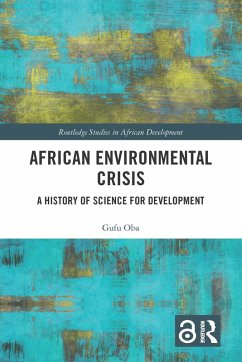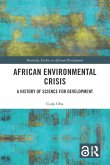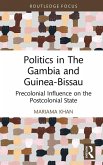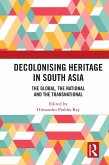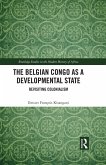0,00 €
0,00 €
inkl. MwSt.
Sofort per Download lieferbar

0 °P sammeln
0,00 €
Als Download kaufen

0,00 €
inkl. MwSt.
Sofort per Download lieferbar

0 °P sammeln
Jetzt verschenken
Alle Infos zum eBook verschenken
0,00 €
inkl. MwSt.
Sofort per Download lieferbar
Alle Infos zum eBook verschenken

0 °P sammeln
- Format: PDF
- Merkliste
- Auf die Merkliste
- Bewerten Bewerten
- Teilen
- Produkt teilen
- Produkterinnerung
- Produkterinnerung

Bitte loggen Sie sich zunächst in Ihr Kundenkonto ein oder registrieren Sie sich bei
bücher.de, um das eBook-Abo tolino select nutzen zu können.
Hier können Sie sich einloggen
Hier können Sie sich einloggen
Sie sind bereits eingeloggt. Klicken Sie auf 2. tolino select Abo, um fortzufahren.

Bitte loggen Sie sich zunächst in Ihr Kundenkonto ein oder registrieren Sie sich bei bücher.de, um das eBook-Abo tolino select nutzen zu können.
African Environmental Crisis explores how and why the idea of the African environmental crisis developed and persisted through colonial and post-colonial periods, and why it has been so influential in development discourse.
- Geräte: PC
- ohne Kopierschutz
- eBook Hilfe
- Größe: 7.25MB
Andere Kunden interessierten sich auch für
![African Environmental Crisis (eBook, ePUB) African Environmental Crisis (eBook, ePUB)]() Gufu ObaAfrican Environmental Crisis (eBook, ePUB)0,00 €
Gufu ObaAfrican Environmental Crisis (eBook, ePUB)0,00 €![A History of West Africa (eBook, PDF) A History of West Africa (eBook, PDF)]() Toyin FalolaA History of West Africa (eBook, PDF)39,95 €
Toyin FalolaA History of West Africa (eBook, PDF)39,95 €![International Law and the History of Resource Extraction in Africa (eBook, PDF) International Law and the History of Resource Extraction in Africa (eBook, PDF)]() George Forji AminInternational Law and the History of Resource Extraction in Africa (eBook, PDF)40,95 €
George Forji AminInternational Law and the History of Resource Extraction in Africa (eBook, PDF)40,95 €![Politics in The Gambia and Guinea-Bissau (eBook, PDF) Politics in The Gambia and Guinea-Bissau (eBook, PDF)]() Mariama KhanPolitics in The Gambia and Guinea-Bissau (eBook, PDF)20,95 €
Mariama KhanPolitics in The Gambia and Guinea-Bissau (eBook, PDF)20,95 €![Decolonising Heritage in South Asia (eBook, PDF) Decolonising Heritage in South Asia (eBook, PDF)]() Decolonising Heritage in South Asia (eBook, PDF)43,95 €
Decolonising Heritage in South Asia (eBook, PDF)43,95 €![A History of Rwanda (eBook, PDF) A History of Rwanda (eBook, PDF)]() Klaus BachmannA History of Rwanda (eBook, PDF)42,95 €
Klaus BachmannA History of Rwanda (eBook, PDF)42,95 €![The Belgian Congo as a Developmental State (eBook, PDF) The Belgian Congo as a Developmental State (eBook, PDF)]() Emizet François KisanganiThe Belgian Congo as a Developmental State (eBook, PDF)40,95 €
Emizet François KisanganiThe Belgian Congo as a Developmental State (eBook, PDF)40,95 €-
-
-
African Environmental Crisis explores how and why the idea of the African environmental crisis developed and persisted through colonial and post-colonial periods, and why it has been so influential in development discourse.
Hinweis: Dieser Artikel kann nur an eine deutsche Lieferadresse ausgeliefert werden.
Dieser Download kann aus rechtlichen Gründen nur mit Rechnungsadresse in A, B, BG, CY, CZ, D, DK, EW, E, FIN, F, GR, HR, H, IRL, I, LT, L, LR, M, NL, PL, P, R, S, SLO, SK ausgeliefert werden.
Hinweis: Dieser Artikel kann nur an eine deutsche Lieferadresse ausgeliefert werden.
Produktdetails
- Produktdetails
- Verlag: Taylor & Francis eBooks
- Seitenzahl: 258
- Erscheinungstermin: 13. März 2020
- Englisch
- ISBN-13: 9781000055832
- Artikelnr.: 58802879
- Verlag: Taylor & Francis eBooks
- Seitenzahl: 258
- Erscheinungstermin: 13. März 2020
- Englisch
- ISBN-13: 9781000055832
- Artikelnr.: 58802879
- Herstellerkennzeichnung Die Herstellerinformationen sind derzeit nicht verfügbar.
Gufu Oba is professor at the Faculty of Landscape and Society (LANDSAM) in the Norwegian University of Life Sciences. His work is interdisciplinary; combining natural sciences, pastoralism and environmental history. His previous books include; Nomads in the shadows of empires (2013), Climate change adaptation in Africa (2014) and Herder warfare in East Africa (2017).
1 The African environmental crisis: Is it a myth? An introduction PART 1 EMPIRE
SCIENCE
SOCIETY AND DEVELOPMENT 2 European exploration of East Africa: Textual analysis of travel narratives
1831-1900 3 Imperial scientific infrastructure: Science for development
1848-1960s 4 African environmental crisis narratives: Schemes
technology and development
1904 -1960 PART 2 ECOLOGICAL AND SOCIAL RESEARCH 5 Experimental science and development: A re-evaluation of the Environmental crisis hypothesis
1939-1960 6 Social science research: Behavioral responses to development
1919-1950 7 Administrative science for development dialogue: Three Kenyan case studies
1943-1954 PART 3 VECTORS
PESTS AND ENVIRONMENTAL CHANGE 8 Tsetse fly control in East Africa: Environmental and social impacts
1880- 1959 9 Locust invasion and control in East Africa: Economic and environmental impacts
1890-1960s 10 A synthesis: Conclusions and epilog
SCIENCE
SOCIETY AND DEVELOPMENT 2 European exploration of East Africa: Textual analysis of travel narratives
1831-1900 3 Imperial scientific infrastructure: Science for development
1848-1960s 4 African environmental crisis narratives: Schemes
technology and development
1904 -1960 PART 2 ECOLOGICAL AND SOCIAL RESEARCH 5 Experimental science and development: A re-evaluation of the Environmental crisis hypothesis
1939-1960 6 Social science research: Behavioral responses to development
1919-1950 7 Administrative science for development dialogue: Three Kenyan case studies
1943-1954 PART 3 VECTORS
PESTS AND ENVIRONMENTAL CHANGE 8 Tsetse fly control in East Africa: Environmental and social impacts
1880- 1959 9 Locust invasion and control in East Africa: Economic and environmental impacts
1890-1960s 10 A synthesis: Conclusions and epilog
1 The African environmental crisis: Is it a myth? An introduction PART 1 EMPIRE, SCIENCE, SOCIETY AND DEVELOPMENT 2 European exploration of East Africa: Textual analysis of travel narratives, 1831-1900 3 Imperial scientific infrastructure: Science for development, 1848-1960s 4 African environmental crisis narratives: Schemes, technology and development, 1904-1960 PART 2 ECOLOGICAL AND SOCIAL RESEARCH 5 Experimental science and development: A re-evaluation of the Environmental crisis hypothesis, 1939-1960 6 Social science research: Behavioral responses to development, 1919-1950 7 Administrative science for development dialogue: Three Kenyan case studies, 1943-1954 PART 3 VECTORS, PESTS AND ENVIRONMENTAL CHANGE 8 Tsetse fly control in East Africa: Environmental and social impacts, 1880-1959 9 Locust invasion and control in East Africa: Economic and environmental impacts, 1890-1960s 10 A synthesis: Conclusions and epilog
1 The African environmental crisis: Is it a myth? An introduction PART 1 EMPIRE
SCIENCE
SOCIETY AND DEVELOPMENT 2 European exploration of East Africa: Textual analysis of travel narratives
1831-1900 3 Imperial scientific infrastructure: Science for development
1848-1960s 4 African environmental crisis narratives: Schemes
technology and development
1904 -1960 PART 2 ECOLOGICAL AND SOCIAL RESEARCH 5 Experimental science and development: A re-evaluation of the Environmental crisis hypothesis
1939-1960 6 Social science research: Behavioral responses to development
1919-1950 7 Administrative science for development dialogue: Three Kenyan case studies
1943-1954 PART 3 VECTORS
PESTS AND ENVIRONMENTAL CHANGE 8 Tsetse fly control in East Africa: Environmental and social impacts
1880- 1959 9 Locust invasion and control in East Africa: Economic and environmental impacts
1890-1960s 10 A synthesis: Conclusions and epilog
SCIENCE
SOCIETY AND DEVELOPMENT 2 European exploration of East Africa: Textual analysis of travel narratives
1831-1900 3 Imperial scientific infrastructure: Science for development
1848-1960s 4 African environmental crisis narratives: Schemes
technology and development
1904 -1960 PART 2 ECOLOGICAL AND SOCIAL RESEARCH 5 Experimental science and development: A re-evaluation of the Environmental crisis hypothesis
1939-1960 6 Social science research: Behavioral responses to development
1919-1950 7 Administrative science for development dialogue: Three Kenyan case studies
1943-1954 PART 3 VECTORS
PESTS AND ENVIRONMENTAL CHANGE 8 Tsetse fly control in East Africa: Environmental and social impacts
1880- 1959 9 Locust invasion and control in East Africa: Economic and environmental impacts
1890-1960s 10 A synthesis: Conclusions and epilog
1 The African environmental crisis: Is it a myth? An introduction PART 1 EMPIRE, SCIENCE, SOCIETY AND DEVELOPMENT 2 European exploration of East Africa: Textual analysis of travel narratives, 1831-1900 3 Imperial scientific infrastructure: Science for development, 1848-1960s 4 African environmental crisis narratives: Schemes, technology and development, 1904-1960 PART 2 ECOLOGICAL AND SOCIAL RESEARCH 5 Experimental science and development: A re-evaluation of the Environmental crisis hypothesis, 1939-1960 6 Social science research: Behavioral responses to development, 1919-1950 7 Administrative science for development dialogue: Three Kenyan case studies, 1943-1954 PART 3 VECTORS, PESTS AND ENVIRONMENTAL CHANGE 8 Tsetse fly control in East Africa: Environmental and social impacts, 1880-1959 9 Locust invasion and control in East Africa: Economic and environmental impacts, 1890-1960s 10 A synthesis: Conclusions and epilog
